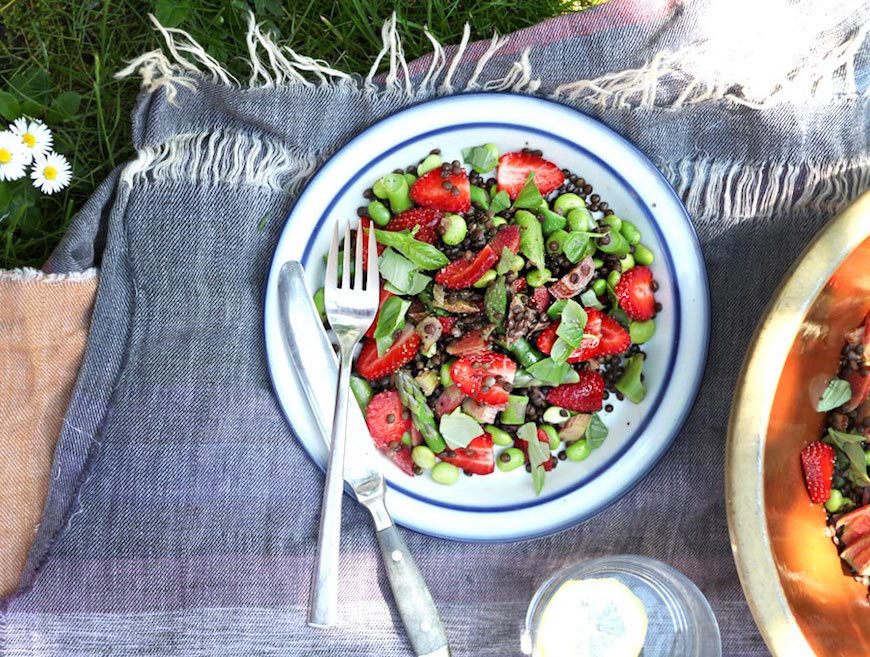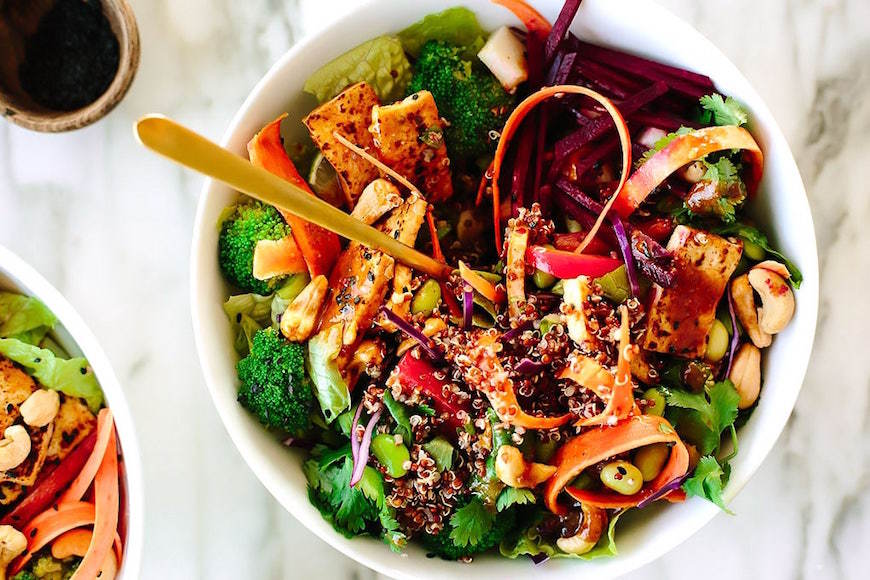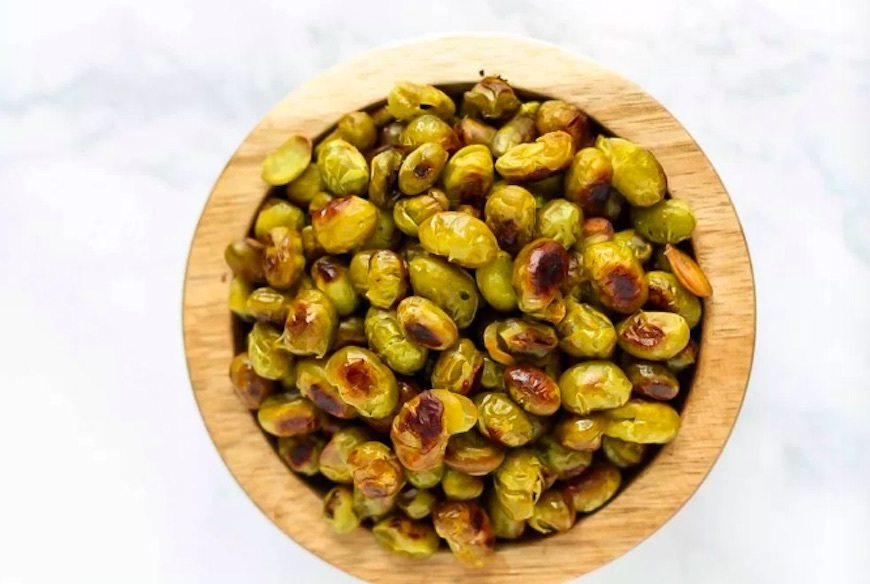Edamame Is the Only Legume That Packs *Complete* Plant-Based Protein—Plus 7 Other Reasons Rds Recommend It
Consider this your edamame benefits primer because all your burning questions are about to be answered ahead with the expert intel of two registered dietitians.
- Amy Shapiro, MS, RD, CDN, founder and director of Real Nutrition
- Mascha Davis, MPH, RDN, registered dietitian and founder of Nomadista Nutrition
8 impressive edamame benefits for health
1. It's a good source of protein
According to registered dietitian Mascha Davis, RD, one cup of frozen edamame has a whopping 18 grams of protein, making it an one of the best high-protein plant foods—especially for plant-based eaters or for folks looking to eat more plants. "It's higher in protein than chickpeas, lentils, or black beans," Davis says.
How does edamame's protein content compare to other legumes? Amy Shapiro, MS, RD, CDN says that it's typically higher in protein and healthy fat and lower in carbohydrates. Shapiro also says that edamame is higher in calcium and folate than other legumes.
2. It has all nine essential amino acids

{{post.sponsorText}}
"What's more, edamame is considered a complete protein. This means it has all the essential amino acids, which doesn't apply to any other type of legume aside from soybeans," Shapiro says.
"Edamame is considered a complete protein. This means it has all the essential amino acids, which doesn't apply to any other type of legume aside from soybeans," Shapiro says.
Leucine, lysine, threonine, tryptophan...gang's all here! Although, edamame isn't the only vegan-friendly source of complete protein. Other options include tempeh, hemp seeds, and quinoa, to name a few.
3. It's a good source of fiber
Another reason why Davis loves edamame is due to its high fiber content, which is great for gut health. "One cup of frozen edamame has eight grams of fiber to help you meet your recommended daily intake goals. This often means smoother digestion," Shapiro says.
4. It's rich in heart-healthy and immune-boosting antioxidants
"Edamame is an excellent source of many nutrients and antioxidants and is a great food to include in your diet," Davis says. In particular, edamame contains a considerable amount of vitamin C, a powerful antioxidant linked to heart health benefits and boosting immunity.
What's more, "edamame contains polyunsaturated fats which have been shown to prevent heart disease and to lower cholesterol," Shapiro says. "It's also rich in antioxidants and polyphenols, which can decrease inflammation."
5. It's packed with folate
"Edamame is a great source of folate," Davis says. Considering the nutrient is linked to lowering the risk of heart disease and strokes while also supporting hair and nail growth, that's a pretty major win.
6. It's a good source of vitamin K
Vitamin K plays an essential role in blood clotting, helps maintain a healthy metabolism, and regulates calcium levels—and it just happens that edamame is full of it. "A cup of edamame covers about 41 percent of our daily vitamin K needs," Davis says. But it's important to pair it with olive oil, avocado, or another "healthy" fat to really reap the benefits. "Vitamin K is a fat-soluble vitamin, so eating some fat with the beans will help absorb more of it," Davis says.
7. It has calcium
Not only does edamame have vitamin K, which helps regulate calcium levels, it contains calcium itself. That makes it a double-win for your bone health.
8. It's full of magnesium
One cup of frozen edamame has 99 milligrams of magnesium, which is linked to potentially helping promote better sleep and also potentially help relieve workout-related leg cramps.
Is it good to eat edamame every day?
According to Shapiro, edamame is totally safe to consume daily. It's also worth addressing that edamame is a soy product, and although its hormonal impact has been hotly debated, most evidence shows it'll likely have minimal, if any at all, impact on your hormone levels. (Basically, soy is high in phytoestrogens, compounds that can mimic the activity of estrogens.) That said, while scientific evidence has largely debunked the idea that moderate amounts of soy will disrupt healthy people's hormones, people who are pregnant, in treatment for hormone-related cancers, or taking thyroid medications may want to talk to their doctor before upping soy intake to make sure it won't interfere with any health concerns.
Soybeans vs. edamame: what's the difference?
The difference is simple: One's in its mature state, while the other is in its immature state. Edamame are immature soybeans that are picked when still "young," while soybeans are picked at a later stage, once they've fully matured. Edamame beans will have a vibrant green color and soft texture, like peas, while soybeans will be harder (like other uncooked beans) and be paler in color (like a yellow-ish, cream hue).
It's also important to keep in mind that soybeans should not be consumed raw, unlike edamame beans, which are safe to do so. "Raw soybeans are considered poisonous so they should only be consumed cooked," Shapiro reiterates. The good news? In cooked form, soybean benefits are just as impressive of edamame benefits.
3 ways to try edamame—besides eating it straight from the pod

1. Maple-Tossed Beluga Lentil Salad
If you're looking for a completely plant-based lunch or dinner that's protein-packed enough to sustain you, this recipe from My New Roots is it. It's made with edamame and lentils—two great energy sources.
Get the recipe: Maple-Tossed Beluga Lentil Salad

2. Spicy Quinoa Bowl
Edamame is a natural star in this protein-packed spicy quinoa bowl by Blissful Basil. The quinoa and cashews give additional protein while the broccoli, carrots, and red cabbage amp up the fiber.
Get the recipe: Thai-Inspired Quinoa Bowl

3. Salt and Vinegar Roasted Edamame
You can also keep things simple and enjoy edamame on its own, with just salt and vinegar drizzled on top. Roasting them in the oven will help them absorb the delicious tangy flavors, making it a truly one of the tastiest bean snacks that's anything but boring.
Get the recipe: Salt and Vinegar Roasted Edamame
Love beans as much as we do? How about using them to make ooey, gooey delicious black bean brownies:
- Michelfelder AJ. Soy: a complete source of protein. Am Fam Physician. 2009 Jan 1;79(1):43-7. PMID: 19145965.
- Moser MA, Chun OK. Vitamin C and Heart Health: A Review Based on Findings from Epidemiologic Studies. Int J Mol Sci. 2016 Aug 12;17(8):1328. doi: 10.3390/ijms17081328. PMID: 27529239; PMCID: PMC5000725.
- Schwalfenberg GK. Vitamins K1 and K2: The Emerging Group of Vitamins Required for Human Health. J Nutr Metab. 2017;2017:6254836. doi: 10.1155/2017/6254836. Epub 2017 Jun 18. PMID: 28698808; PMCID: PMC5494092.
Loading More Posts...